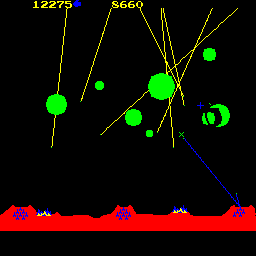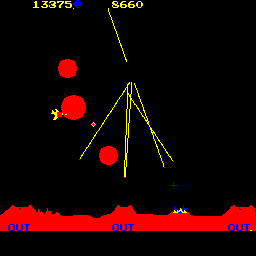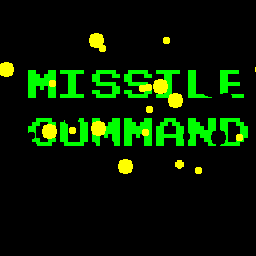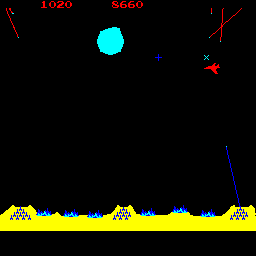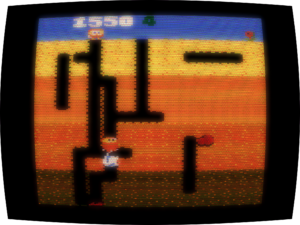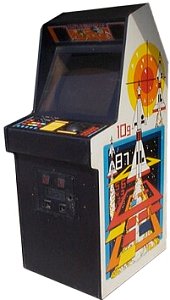
 The Game: Tucked away safely in an underground bunker, you are solely responsible for defending six cities from a relentless, ever-escalating ICBM attack. Your three missile bases are armed with nuclear missiles capable of intercepting the incoming enemy nukes, planes and smart bombs. One nuke hit on any of your three launch bases will incapacitate that facility for the rest of your current turn, but one nuke hit on any of your six cities will destroy it completely. (The only chance you have of rebuilding a city comes when a bonus city is awarded for every 10,000 points scored.) And when all six of your cities have been destroyed, the cataclysmic end of the world proceeds. Game over. (Atari, 1980)
The Game: Tucked away safely in an underground bunker, you are solely responsible for defending six cities from a relentless, ever-escalating ICBM attack. Your three missile bases are armed with nuclear missiles capable of intercepting the incoming enemy nukes, planes and smart bombs. One nuke hit on any of your three launch bases will incapacitate that facility for the rest of your current turn, but one nuke hit on any of your six cities will destroy it completely. (The only chance you have of rebuilding a city comes when a bonus city is awarded for every 10,000 points scored.) And when all six of your cities have been destroyed, the cataclysmic end of the world proceeds. Game over. (Atari, 1980)
Memories: Possibly the first video game ever to register on the so-called moral compass, Atari’s Missile Command contained a strong, anti-nuclear message, arriving at the dawn of Ronald Reagan’s presidency. For those of you who weren’t alive at that time, here’s a little bit of historical context.
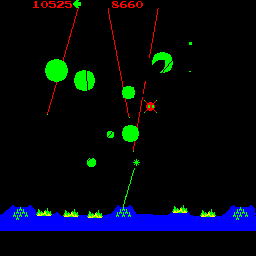 Reagan’s barely-diplomatic saber rattling with a quick succession of Soviet Premiers made his reign in the White House one of the biggest nuclear scares since the Cuban Missile Crisis. What with Reagan declaring the U.S.S.R. to be the “evil empire,” creating the Strategic Defense Initiative, and pissing off the Middle East from Iran to Libya (and God knows, we haven’t heard a peep out of the Middle Eastern countries since then!), Missile Command was more than a game…it was more of a harbinger. Of course, in 1980, these things hadn’t happened yet…but by the time they did, Atari’s innocuous little game had given us an idea of what the outcome could be – a no-win situation.
Reagan’s barely-diplomatic saber rattling with a quick succession of Soviet Premiers made his reign in the White House one of the biggest nuclear scares since the Cuban Missile Crisis. What with Reagan declaring the U.S.S.R. to be the “evil empire,” creating the Strategic Defense Initiative, and pissing off the Middle East from Iran to Libya (and God knows, we haven’t heard a peep out of the Middle Eastern countries since then!), Missile Command was more than a game…it was more of a harbinger. Of course, in 1980, these things hadn’t happened yet…but by the time they did, Atari’s innocuous little game had given us an idea of what the outcome could be – a no-win situation.
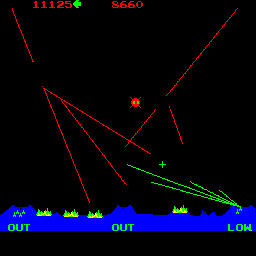 Pretty scary stuff for a quarter.
Pretty scary stuff for a quarter.
 Atari naturally kept the rights to Missile Command for itself, promptly introducing an Atari 2600 edition, following up with Missile Command cartridges for the Atari 400 and 800 computers and the Atari 5200, all of which were above-average games. But in one of Atari’s savviest marketing moments, it didn’t make a version of Missile Command for any other platforms. Missile Command also had a seismic effect on home video game hardware, as it inspired Atari engineer Dan Kramer to create a self-contrained trackball unit for use on the Atari home computers – simply because he wanted the well-made computer version to play more like its arcade counterpart.
Atari naturally kept the rights to Missile Command for itself, promptly introducing an Atari 2600 edition, following up with Missile Command cartridges for the Atari 400 and 800 computers and the Atari 5200, all of which were above-average games. But in one of Atari’s savviest marketing moments, it didn’t make a version of Missile Command for any other platforms. Missile Command also had a seismic effect on home video game hardware, as it inspired Atari engineer Dan Kramer to create a self-contrained trackball unit for use on the Atari home computers – simply because he wanted the well-made computer version to play more like its arcade counterpart.
